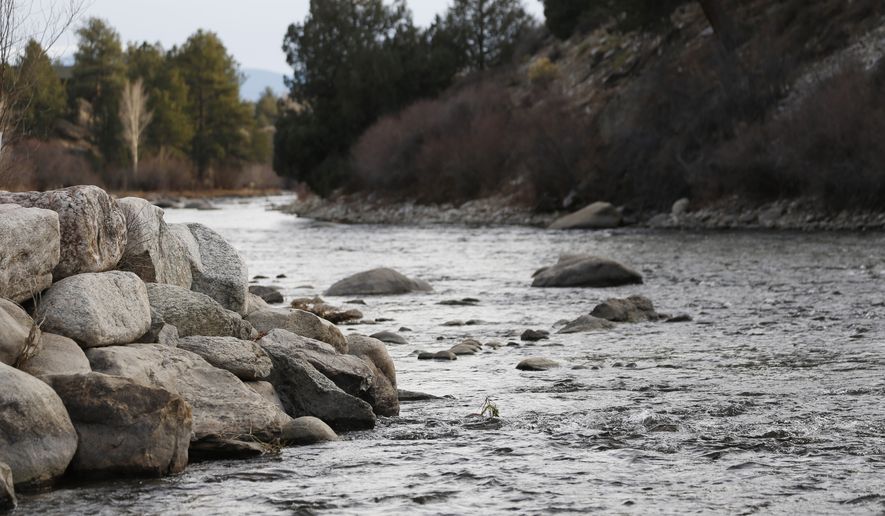DENVER — Not everyone was thrilled by President Obama’s plan to designate another national monument in Colorado, this time a 21,000-acre area around the Arkansas River called Browns Canyon.
While Democrats and environmental groups cheered the pending announcement, some Western Republicans were fuming Wednesday over Mr. Obama’s repeated use of the Antiquities Act of 1906 to bypass the legislative process and create national monuments on his own.
Rep. Ken Buck, Colorado Republican, issued a statement calling on Mr. Obama to “cut it out.”
“He is not king. No more acting like King Barack,” Mr. Buck said. “That is not how we do things in the U.S. Actions like this lead the American people to view Mr. Obama’s presidency as an imperial presidency.”
Browns Canyon becomes the third national monument to be designated by Mr. Obama under the Antiquities Act in Colorado and the 16th nationally. The president is slated to make the announcement Thursday in Chicago.
Mr. Obama is also expected to designate Thursday two more national monuments: the Pullman Historic District in Chicago, a 203-acre site, and the Honouliuli Internment Camp in Hawaii, which spans 440 acres in Oahu.
Supporters of the Browns Canyon designation, including environmental and outdoor groups, noted that Browns Canyon has a history. Colorado lawmakers had waged bipartisan efforts for years to gain protected status for the area, although those bills were aimed at having the canyon recognized as a wilderness area, not a national monument.
Keith Baker, executive director of Friends of Browns Canyon, said in a statement Wednesday the designation “will provide permanent protection that is long overdue for this incredible area,” while Sen. Michael Bennet, Colorado Democrat, said the canyon has “a rugged and unique beauty that attracts outdoor enthusiasts from around the world.”
“Coloradans have been very clear they wanted this protection, along with assurances that existing uses will be protected. We’re glad the administration heard those voices and provided those assurances,” Mr. Bennet said in a statement.
Former Colorado Rep. Joel Hefley, a Republican whose district included the Browns Canyon area, said he was “thrilled” that the region would finally receive federal status. He introduced the Browns Canyon Wilderness Act in 2005.
“The people of Chaffee County have been working together for many years to protect this scenic landscape and the important river corridor that runs through Browns Canyon,” Mr. Hefley said in a statement. “This new National Monument will mean a lot to Chaffee County and also for future generations as they enjoy this special place. I am thrilled that after all these years it is finally happening.”
But Rep. Doug Lamborn, the Colorado Republican who succeeded Mr. Hefley, called the designation “a top-down, big government land grab by the President that disenfranchises the concerned citizens in the Browns Canyon region.”
SEE ALSO: Washington state offers two-month reprieve for Obamacare enrollment deadline
He cited concerns from locals about the impact of the designation on “grazing rights, water rights, outdoor recreation, and the inability of first responders to manage and fight wildfires in the area.”
Roping off a region as a national monument doesn’t necessarily do the area any favors because federal lands are often poorly managed,” Mr. Lamborn said. “It is also important for people to note that national monuments created by Presidential executive order under the Antiquities Act almost always become underfunded, neglected properties,” Mr. Lamborn said. “This is because they are created without normal Congressional and local consensus, robbing the people of a fair and open process that stifles the input of the community. And they become orphans once the Administration changes. Does Browns Canyon really deserve this kind of second-class status?”
House Natural Resources Committee chair Rob Bishop said Mr. Obama has “sidelined the American public and bulldozed transparency by proclaiming three new national monuments through executive fiat.”
“This White House has shown once again its utter and complete disdain for the public process, Congress, and the communities most impacted by these unilateral, unchecked land designations,” the Utah Republican said in a statement.
Sen. Cory Gardner, Colorado Republican, struck a more cordial tone, calling the area a “national treasure” and saying that the monument would be a lasting tribute to the service of former Democratic Sen. Mark Udall, who had fought for years to have Browns Canyon so designated.
At the same time, Mr. Gardner, who defeated Mr. Udall in November, said that he will introduce legislation to address local concerns about the designation.
“My preference is always to work through the legislative process, and in the coming days I will be introducing legislation to ensure that Colorado’s state and local interests have a seat at the table in discussions about Browns Canyon,” Mr. Gardner said.
The other two sites are far less contentious.
The Pullman site in Chicago includes manufacturing and other buildings associated with the Pullman Palace Car Company, which both built and staffed the iconic traincars. By providing service jobs and a labor agreement with the black-dominated union, the company helped build the post-slavery black middle class and the civil rights movement, the White House said.
Both Illinois senators — Democrat Richard Durbin and Republican Mark Kirk — unambiguously praised the Pullman designation.
The Honouliuli camp opened in 1943 to hold foreign citizens, resident aliens, prisoners of war and others. Over the course of the war, it held about 4,000 people in various categories of detainees, but fell into disuse. It is now privately owned and only two buildings from the original camp are intact.
The White House said the designation honors “the fragility of civil rights during times of conflict.” The designation was unanimously praised by Hawaii’s federal lawmakers Wednesday.
The League of Conservation Voters applauded the president’s latest designations, saying, “President Obama continues to take bold steps to protect America’s special places and we can’t wait to see what’s next.”
• Valerie Richardson can be reached at vrichardson@washingtontimes.com.




Please read our comment policy before commenting.